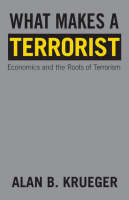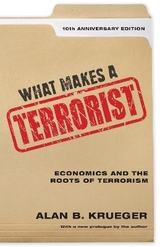
What Makes a Terrorist
Economics and the Roots of Terrorism - New Edition
Seiten
2008
|
Revised edition
Princeton University Press (Verlag)
978-0-691-13875-6 (ISBN)
Princeton University Press (Verlag)
978-0-691-13875-6 (ISBN)
- Titel erscheint in neuer Auflage
- Artikel merken
Zu diesem Artikel existiert eine Nachauflage
Many popular ideas about terrorists and why they seek to harm us are fueled by falsehoods and misinformation. This title argues that if we are to correctly assess the root causes of terrorism and successfully address the threat, we must think more like economists do.
Many popular ideas about terrorists and why they seek to harm us are fueled by falsehoods and misinformation. Leading politicians and scholars have argued that poverty and lack of education breed terrorism, despite the wealth of evidence showing that most terrorists come from middle-class, and often college-educated, backgrounds. In What Makes a Terrorist, Alan Krueger argues that if we are to correctly assess the root causes of terrorism and successfully address the threat, we must think more like economists do. Krueger is an influential economist who has applied rigorous statistical analysis to a range of tough issues, from the minimum wage and education to the occurrence of hate crimes. In this book, he explains why our tactics in the fight against terrorism must be based on more than anecdote and speculation. Krueger closely examines the factors that motivate individuals to participate in terrorism, drawing inferences from terrorists' own backgrounds and the economic, social, and political conditions in the societies from which they come. He describes which countries are the most likely breeding grounds for terrorists, and which ones are most likely to be their targets.
Krueger addresses the economic and psychological consequences of terrorism. He puts the terrorist threat squarely into perspective, revealing how our nation's sizeable economy is diverse and resilient enough to withstand the comparatively limited effects of most terrorist strikes. And he calls on the media to be more responsible in reporting on terrorism. What Makes a Terrorist brings needed clarity to one of the greatest challenges of our time.
Many popular ideas about terrorists and why they seek to harm us are fueled by falsehoods and misinformation. Leading politicians and scholars have argued that poverty and lack of education breed terrorism, despite the wealth of evidence showing that most terrorists come from middle-class, and often college-educated, backgrounds. In What Makes a Terrorist, Alan Krueger argues that if we are to correctly assess the root causes of terrorism and successfully address the threat, we must think more like economists do. Krueger is an influential economist who has applied rigorous statistical analysis to a range of tough issues, from the minimum wage and education to the occurrence of hate crimes. In this book, he explains why our tactics in the fight against terrorism must be based on more than anecdote and speculation. Krueger closely examines the factors that motivate individuals to participate in terrorism, drawing inferences from terrorists' own backgrounds and the economic, social, and political conditions in the societies from which they come. He describes which countries are the most likely breeding grounds for terrorists, and which ones are most likely to be their targets.
Krueger addresses the economic and psychological consequences of terrorism. He puts the terrorist threat squarely into perspective, revealing how our nation's sizeable economy is diverse and resilient enough to withstand the comparatively limited effects of most terrorist strikes. And he calls on the media to be more responsible in reporting on terrorism. What Makes a Terrorist brings needed clarity to one of the greatest challenges of our time.
Alan B. Krueger is the Bendheim Professor of Economics and Public Policy at Princeton University and an adviser to the National Counterterrorism Center. He is the coauthor of "Inequality in America" and "Myth and Measurement" (Princeton).
PREFACE ix Introduction 1 CHAPTER 1: Who Becomes a Terrorist? Characteristics of Individual Participants in Terrorism 11 CHAPTER 2: Where Does Terror Emerge? Economic and Political Conditions and Terrorism 53 CHAPTER 3: What Does Terrorism Accomplish? Economic, Psychological, and Political Consequences of Terrorism 105 QUESTIONS AND ANSWERS FOLLOWING THE LECTURES 143 REFERENCES 163 INDEX 173
| Erscheint lt. Verlag | 22.9.2008 |
|---|---|
| Zusatzinfo | 11 halftones. 10 line illus. 21 tables. |
| Verlagsort | New Jersey |
| Sprache | englisch |
| Maße | 140 x 216 mm |
| Gewicht | 255 g |
| Themenwelt | Sozialwissenschaften ► Politik / Verwaltung |
| Wirtschaft ► Volkswirtschaftslehre ► Makroökonomie | |
| ISBN-10 | 0-691-13875-3 / 0691138753 |
| ISBN-13 | 978-0-691-13875-6 / 9780691138756 |
| Zustand | Neuware |
| Haben Sie eine Frage zum Produkt? |
Mehr entdecken
aus dem Bereich
aus dem Bereich
Volkswirtschaftslehre für eine sich ändernde Welt
Buch | Hardcover (2024)
De Gruyter Oldenbourg (Verlag)
CHF 62,90
Kompakt und prüfungsrelevant für Wirtschaftswissenschaftler
Buch | Softcover (2021)
Vahlen, Franz (Verlag)
CHF 16,65
Makroökonomie, Wirtschaftspolitik und nachhaltige Entwicklung
Buch | Hardcover (2022)
Vahlen (Verlag)
CHF 69,70



